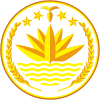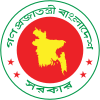| Government of Bangladesh | |
|---|---|
| Bengali: বাংলাদেশ সরকার | |
 · ·  | |
| Overview | |
| Established | 10 April 1971 |
| State | People's Republic of Bangladesh |
| Leader | Chief Adviser of Bangladesh (interim) |
| Appointed by | President of Bangladesh |
| Main organ | Cabinet of Bangladesh |
| Ministries | 23 advisers, 353 departments and directorates |
| Responsible to | Jatiya Sangsad |
| Annual budget | ৳797000 crore (US$67 billion) (2024–25) |
| Headquarters | Bangladesh Secretariat, Dhaka |
| Website | bangladesh.gov.bd |
| This article is part of a series on the |
| Politics of Bangladesh |
|---|
 |
|
|
|
|
The Government of the People's Republic of Bangladesh (Bengali: গণপ্রজাতন্ত্রী বাংলাদেশ সরকার — Gôṇôprôjātôntrī bānglādēsh shôrkār) is the central executive government of Bangladesh. The government was constituted by the Constitution of Bangladesh comprising the executive (the president, prime minister and cabinet), the legislature (the Jatiya Sangsad), and the judiciary (the Supreme Court). Bangladesh is a unitary state[1] and the central government has the authority to govern over the entirety of the nation. The seat of the government is located in Dhaka, the capital of Bangladesh.[2][3][4]
The executive government is led by the prime minister, who selects all the remaining ministers. The prime minister and the other most senior ministers belong to the supreme decision-making committee, known as the Cabinet. After the resignation of Sheikh Hasina in August 2024, the current interim government is led by Dr. Muhammad Yunus.
- ^ "Article 1". Legislative and Parliamentary Affairs Division, Ministry of Law, Justice and Parliamentary Affairs. 4 November 1972. Retrieved 23 July 2021.
- ^ "Part VI: The Executive". Legislative and Parliamentary Affairs Division, Ministry of Law, Justice and Parliamentary Affairs. 4 November 1972. Retrieved 23 July 2021.
- ^ "Part V: The Legislature". Legislative and Parliamentary Affairs Division, Ministry of Law, Justice and Parliamentary Affairs. 4 November 1972. Retrieved 23 July 2021.
- ^ "Part VI: The Judiciary". Legislative and Parliamentary Affairs Division, Ministry of Law, Justice and Parliamentary Affairs. 4 November 1972. Retrieved 23 July 2021.


